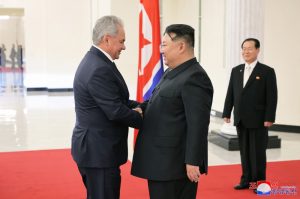KJU Meets Shoigu

Kim Jong Un (KJU; Kim Cho’ng-u’n) met Sergei Shoigu, Secretary of the Russian Security Council on 21 March (Friday). This was Shoigu’s third visit to the DPRK since July 2023 and his second within the last six months.
KJU’s interaction with Shoigu took place at the Workers’ Party of Korea [WPK] Central Committee Office Building “in a trustworthy and warm atmosphere.” Shoigu handed over a personal communique from Russian President Vladimir Putin to KJU. The letter likely included a formal invitation for KJU to visit Russia during 2025; the Russian Foreign Ministry later announced that the two countries were still ironing out the details.
The two talked geopolitics and the overall security environment. DPRK state media implied that Pyongyang and Moscow are not in total agreement on some issues (“a wide-ranging exchange of views and opinions”) but have developed a dynamic in which those differences can be discussed in candid fashion. The KJU-Shoigu interaction attained “consensus of [the] stand of the two sides.”
KJU gave North Korea’s support for Russia’s continuing special military operation Ukraine stating “it was the steadfast option and resolute will of the DPRK government to invariably support Russia in the struggle for defending its national sovereignty, territorial integrity and security interests in the future.”
Shoigu and KJU “expressed the willingness of the leaderships of the two countries to unconditionally implement the provisions of the treaty on the comprehensive strategic partnership” and “prospective undertakings for further expanding and boosting exchanges and cooperation in security and other many-sided fields.”
There were a couple of nuggets to be collected from the KJU-Shoigu tête-à-tête. KJU’s remarks strongly hint (“invariably support”) that they discussed North Korea’s deployment and munitions shipments to eastern Europe. While KJU and Segei Shoigu may have discussed the deployment and the DPRK’s contributions, it does not directly indicate that Pyongyang has any further follow-on-force deployments to Kursk (or elsewhere) planned. As yet, no evidence, aside from rumint and speculation, exists.
On the other hand, it is all but certain that Shoigu and KJU discussed current plans for Russia and Ukraine to deescalate and negotiate a truce. To that effect, Shoigu may also have discussed President Putin’s 18 March telephone call with President Trump which may have included passing mention of potential US-DPRK interactions. Of course, Putin himself may have discussed the call in his letter to KJU.
KJU was joined at the discussion by WPK Secretary for Military Affairs and Central Military Commission [CMC] Pak Jong Chon (Pak Chong-chon). This was the first time KJU brought a top official to a Shoigu interaction. Pak’s presence at the meeting indicates that KJU and Shoigu held “a wide-ranging exchange” on military matters including the North’s deployment and defense industry cooperation.
We might add Pak Jong Chon’s attendance at the Shoigu interaction with WPK Secretary for Cadres Affairs Ri Hi Yong leading a delegation to Russia during February which involved meetings with President Putin, Dmitry Medvedev and other top officials of the United Russia Party. These interactions indicate that DPRK-Russia relations have elevated to their next phase beyond the gatekeeping of the DPRK Foreign Ministry.
KJU is making his close aides available to Russian interlocutors—as cooperation deepens in line with the comprehensive strategic agreement, it will involve (or has started to involve) far more policy and personnel detail in which principals like KJU or Putin need to engage. This practice (albeit, not yet a trend) is likely to continue and the Russian side can be assured by engaging these top party officials that they have direct access to KJU and the channels through which he receives advice and information. Ri’s visit to Moscow and Pak’s attendance at the Shoigu meeting also gives the WPK Central Committee skin in the external relations games which raises the probability of the North Korean side successfully implementing the comprehensive agreement.
2025 finds North Korea motivated to engage in a so-called “diplomatic offensive.” The Supreme People’s Assembly [SPA] has replenished members to the SPA Foreign Affairs Committee [FAC]; SPA FAC Chairman (and WPK International Affairs Department Director) Kim Song Nam (Kim So’ng-nam) was part of Ri Hi Yong’s delegation during its February trip to Moscow. As Pyongyang starts to engage with other countries, further observation of the DPRK’s interlocutors and the frequency and depth of the exchanges will be warranted.
View Original Article